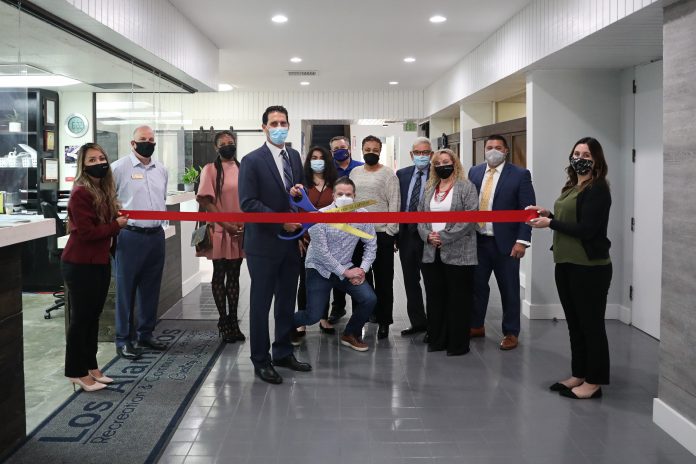
Following decades of budget cuts and shrinking revenues, a new measure narrowly approved by residents has not only reversed the downward trajectory of Los Alamitos, but apparently has put the city on a path to budget surpluses for years to come.
The initial assessment of the city’s financial future came this week as the Los Alamitos City Council held a special “budget preview” meeting to discuss budgets going forward.
The city’s proposed 1.5 percent sales tax, passed in a cliffhanger vote Nov. 3, as 50.9 percent of voters agreed to pay more with every dollar spent to return the city to financial solvency.
Had it not been approved, interim finance director Craig Kohler told the Council Monday that the city would have run deficits for the foreseeable future and, barring some unforeseen intervention, the city would have used its entire reserve over the next three years.
“Clearly,” said Kohler, “the revenues and the reserves were declining and by the fourth year out, we would have depleted our reserves and we would have been in the red.”
In fact, the city had to make budget cuts totaling more than $1.5 million just to balance the current fiscal year budget of approximately $16 million balanced.
With the passage of Measure Y, however, Kohler said in his preliminary 2021-2022 budget presentation to the Council all that is now changed.
Most gratifying, said Kohler, the new sales tax provides the city with “local control,” meaning the funds derived by the measure “cannot be taken by the state.”
With the new revenue provided by Measure Y, “all of the (projected) deficits have turned into surplus,” Kohler told the Council. In his preliminary budget estimates, the more than $4 million generated annually by the new tax accounts for more than 60 percent of the city’s annual revenue.
Accordingly, Kohler said projected budgets for the next few years range from $16.6 million in 21-22 to $18.3 million in 25-26, with an average surplus of approximately $2.5 million for each year for which the projections were made.
Also, Kohler said economic projections are encouraging. He said the economy is growing at its fastest clip in recent memory, with more than 33 percent of real gross domestic product growth in the third quarter of 2020.
Kohler said some categories are showing growth, yet others, like the transit occupancy tax, will obviously be slower returning to past productivity levels.
“On the bright side, construction and building supplies have seen significant uptick in activity recently,” said Kohler.
Among the budgeting changes, said Kohler, the city is considering switching to a two-year budget cycle instead of using the single year budgetary process.
“It’s going to assist the city in focusing on short term and long term goals,” said Kohler, “while providing more strategic deployment of available funding.”
Acting Deputy City Manager Ron Noda said the city is looking at $1.6 million in capital improvements next year, with only approximately $250,000 coming from the city’s general fund. Retiring Police Chief Eric R. Nunez said the department’s projected budget of $7.3 million will hopefully allow them to return to their allotted 24 positions within the department.
City Manager Chet Simmons discussed a number of proposed changes in the administration, emphasizing this was a “first look” at a series of long needed reforms.
“We are looking at a number of models,” he told the Council. Simmons said the budget preview is to provide the council a preview of some potential changes and a macro look at the long-term positive view of city finances going forward.
Mayor Mark Chirco said he was happy the city was in a place where the Council could finally resurrect some long-delayed capital improvements and economic development projects.
“We can hopefully implement measure improvements,” said Chirco, saying capital improvement projects could “modernize our city for the benefits of our residents.”
Also, he and other members of the Council expressed satisfaction that new investments can be made into the police department to improve response time to calls for service.
“Our police department has been understaffed for years,” he said, “and it’s been affecting our response times.”
Mayor Pro-tem Shelly Hasselbrink brought up the “800-pound elephant in the room,” the huge pension debt that Hasselbrink said “got us in this mess in the first place.”
“I want to make sure it’s not an afterthought,” she said. “I know it’s not sexy,” said
Hasselbrink, “but I want us to get to the point that we never have to say that again.”
Hasselbrink said there are a “number of mechanisms,” that can be used to bring the city’s pension debt under control, and the Mayor Pro-tem said she wanted to make sure potential plans to deal with the debt come up when the actual budget is presented next month.
Council member Ron Bates consistently made it clear that the administration should not add any new positions until all of the staff is back to pre-pandemic levels and a proper evaluation of the “workload” can be made.
In addition, Bates asked for the staff to explore which tasks or functions could be contracted to private vendors, presumably to keep staff costs lower and reducing the city’s pension liability.
